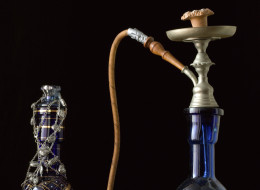
By Shereen Lehman
(Reuters Health) – High levels of benzene, a chemical in crude oil and gasoline, are present in hookah smokers and nonsmokers after they attend social events where the water pipes are used, a new report says.
Benzene exposure is a known risk factor for leukemia. Since there are no safe levels of benzene exposure, interventions to prevent or reduce hookah smoking or regulate the tobacco products are needed, say the authors.
“Hookah smoking involves tobacco which is simply hazardous to the health of those who smoke it, and those who socialize or live with them,” Nada Kassem, who led the study, told Reuters Health in an email.
Burning charcoal is needed to heat the hookah tobacco to generate the smoke, said Kassem, who is the associate director at the Center for Behavioral Epidemiology and Community Health at San Diego State University.
“In addition to inhaling toxicants and carcinogens found in the hookah tobacco smoke, hookah smokers, and non-smokers who socialize with them, also inhale large quantities of charcoal combustion-generated toxic and carcinogenic emissions,” she said, adding that benzene is present in both tobacco smoke and the burnt charcoal emissions.
Kassem and colleagues had 105 hookah smokers and 103 non-smokers spend an average of three hours at either a hookah lounge or a house party where hookah was smoked.
In the journal Cancer Epidemiology, Biomarkers and Prevention, they explain that urine levels of a substance called SPMA can be used to assess exposure to benzene.
SPMA stands for S-phenylmercapturic acid, a byproduct of benzene.
In hookah smokers, benzene uptake quadrupled after they smoked hookah tobacco in hookah lounges, and doubled after they smoked hookah tobacco in private homes, Kassem said.
In non-smokers, the uptake of benzene did not change after events in private homes but increased 2.6 times after attending a social event in a hookah lounge.
“This important study adds to the growing literature demonstrating that water pipe tobacco smoking exposes user to many of the same smoke toxicants to which cigarette smokers are exposed,” Thomas Eissenberg told Reuters Health by email.
Eissenberg, a researcher with Virginia Commonwealth University in Richmond, studies water pipe smoking but wasn’t involved in this study. In comments to Reuters Health earlier this year, he noted that hookah smokers often mistakenly believe the water in the pipe filters out the dangerous toxins in the smoke – which is not the case. (See Reuters Health article of May 16, 2014, here: http://reut.rs/S4ccA0.)
Eissenberg said this new study highlights one of the many risks of hookah smoking while also addressing concerns about previous work having been done in laboratories and not natural settings.
“Both the laboratory and the naturalistic studies are consistent with one another, that water pipe tobacco smoke contains many toxicants, including nicotine that causes dependence, tobacco-specific nitrosamines that cause cancer, carbon monoxide that causes cardiovascular disease, and now benzene that causes leukemia, and water pipe tobacco smokers have these same toxicants in their bodies after they smoke tobacco in a water pipe,” Eissenberg said.
He said a growing body of literature clearly points to the need to regulate water pipe tobacco and water pipe tobacco smoking at least as strictly as tobacco cigarettes.
Eissenberg also noted that in this study, nearly one in five hookah smokers said they smoked a water pipe daily.
“There is an oft-repeated myth that water pipe use in this country is only occasional and thus somehow not harmful,” Eissenberg said, “In fact, inhaling toxic smoke involves substantial health risk, and there are many individuals in this country who inhale toxic water pipe smoke every day.”
SOURCE: http://bit.ly/1FjdOJB Cancer Epidemiology, Biomarkers and Prevention, online November 21, 2014.

